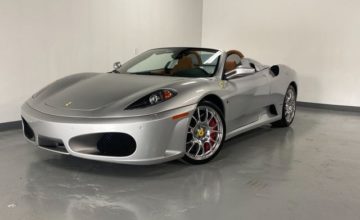In just a short time, Lexus has established itself as a top luxury brand, scoring points in reliability and customer satisfaction which made it the highest selling premiere car in America. The Lexus story started in 1983 when Toyota chairman Eiji Toyoda challenged his company executives to create a luxury car that could compete with the best. The challenge spurred the top-secret F1 project and teams of Toyota agents went to the US to study the upscale automobile market and to design concepts. The first running prototypes were built in 1985 and performance testing began in Germany the next year. The final design was approved by management, and in 1987, Toyota unveiled its first Lexus car, the LS 400 – a product of 6 years of development that cost the company well over 1 billion dollars.
The LS 400 marked a major shift in Toyota design, a car that shares little resemblance with former Toyota models. The car quickly gained a reputation for the quietness of its cabin and engines, well-appointed interiors, admirable engine performance, and technical soundness of the Lexus parts. It received several awards such as Car and Driver 10 Best, Motoring Press Association Best Imported Car, and J.D. Powers #1 Carline in Initial Quality – an award that Lexus would continue to receive every year up to the present.
Lexus is the top selling luxury brand in America for two reasons: dedication to quality and close partnership with its customers. Its assembly plant in Tahara, Japan received the Platinum Plant Quality Award in 2005, an honor it earned for having the fewest defects of any manufacturing plant in the world. Lexus parts undergo stricter quality control and closer inspection, resulting to the reliability of Lexus vehicles. The same level of attention to Lexus parts is extended to Lexus customers. After-sales service at Lexus has been rated the best by J.D. Powers and the Luxury Institute. Instead of slashing prices to compete with other luxury brands, Lexus lures in customers by offering perks and premium services for free. Dealership amenities include uniformed valet and concierge service, designer cafes, in-house boutique, and playroom for children. Customers responded to these twin trademarks by buying Lexus and staying loyal to the brand. In 2005, Lexus sold 302,895 cars in the United States alone, and remains as the top selling luxury marque in the country today.
Lexus recently inaugurated the L-Finnesse philosophy, a design program for its LF concept vehicles. L-Finesse is the guiding principle for Lexus’ new breed of cars that will represent the three ideals: Intriguing Elegance, Seamless Anticipation, and Incisive Simplicity. This is Lexus’ response to criticisms that its designs are somewhat understated when compared to other luxury brands it competes with. Lexus has since unveiled a series of concept cars embodying the L-Finesse philosophy. Debuted in 2003, the LF-S concept car or Lexus Future-Sedan features side-mounted cameras, keyless doors, and windshields that extend to the roof, while the LF-C or Lexus Future Coupe is a sports coupe concept car with a front-mounted V8 engine and six-speed sequential automatic transmission.

